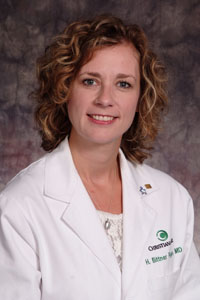Have you been screened for colorectal cancer? A reminder helps, study says


Patients who receive reminders by phone or mail are three times more likely to be screened for colorectal cancer, according to a recently published study of patients in primary-care practices affiliated with Christiana Care Health System.
Heather Bittner Fagan, M.D., MPH, leading co-investigator, says of the study published in Cancer Epidemiology, Biomarkers and Prevention in January: “It’s exciting when we can use our own data to proactively reach out to patients and ask ‘how can we help you to get screened?’” Dr. Fagan is also the director of research in Family and Community Medicine and a Value Institute Scholar at Christiana Care.
The American Cancer Society and the United States Preventative Services Task Force recommend colorectal cancer screening for all normal-risk individuals beginning at age 50. Both the ACS and the USPSTF offer several options for screening method. In the United States, the most commonly used test is colonoscopy followed by stool blood testing.
From 2007 to 2011, the team of researchers identified and recruited more than 900 patients who were at normal risk, age 50-79, not up-to-date for colorectal cancer screening and who had a relationship with one of the primary-care practices at Christiana Care.
In the study, a baseline survey determined the patients’ readiness to screen and any test preference (stool blood testing vs. colonoscopy). About one-third of the patients did not receive any additional contact; one-third received tailored materials based on their initial responses, and the final one-third received phone calls from a nurse navigator to assist them in completing colorectal cancer screening.
Overall, patients who were contacted were far more likely to be screened, the researchers found. Thirty-eight percent of patients who got tailored phone interventions and 33 percent of patients who received mailings completed tests. Without a reminder, only 12 percent of patients were screened.
“We know that interventions have been shown to make a difference in cervical and breast screenings,” says Nora Katurakes, RN, Christiana Care’s manager of Community Health Outreach & Education and a co-author of the study. “This study reinforces that these interventions can make a difference in screening for other cancers.”
At Christiana Care, the lessons learned from the study are put into practice on a regular basis when nurse navigators reach out to patients in primary-care practices with an informative reminder to get screened for colorectal cancer.
“Delaware has gone from near the bottom to near the top for colorectal cancer screening, and there is no disparity,” Dr. Fagan says. “The outcomes show that being proactive results in many more patients receiving screenings that can save their lives.”